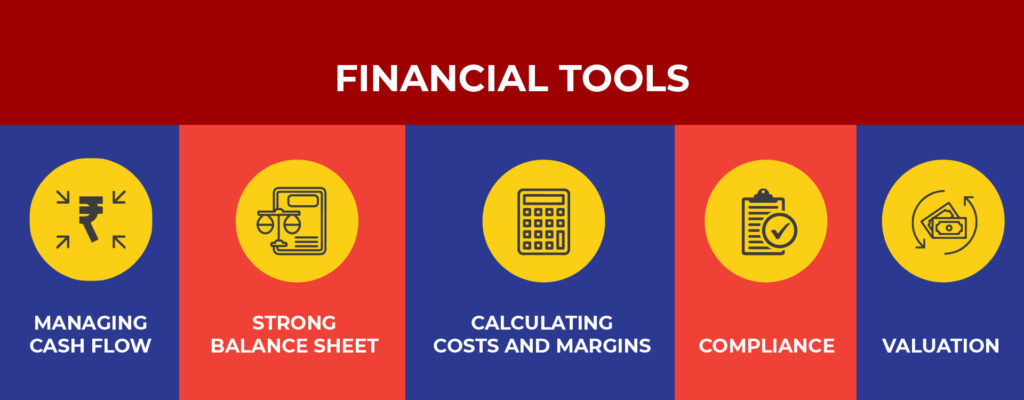A common tendency among entrepreneurs, particularly of startups, is to accord the least priority to finance and accounting; whether to know about it or get help on it. This is one mistake most non-finance entrepreneurs commit that can turn out to be very costly to their business.
Neglect Finance at your peril
Start-up entrepreneurs need to know a certain amount of finance for two reasons:
- To get a feel of what is happening in their business in terms of its performance and outlook
- Their cash flow will not permit them to onboard senior finance professionals in the early stages.
If startup founders don’t have the budget to hire an accountant, they will need to be their own. Even if the company does have an accountant, entrepreneurs should understand enough about the subject to have meaningful conversations with their potential partners, investors, auditors, authorities, employees, customers, suppliers, and other internal and external stakeholders.
That said, having reasonable knowledge of finance and accountancy is important not only for startup entrepreneurs but for anyone running or managing a business. Even when you have qualified finance professionals at senior levels in your organisation, it is of utmost importance that you understand finance.
Managing costs, cash flow, invoices, vendors, collection, taxes and payroll probably isn’t what a start-up entrepreneur imagined would do when he decided to launch his own business. But they are critical components of running any successful company, especially in the early stages when they are both steering the ship and running the show.
For almost all organisations, accounting and finance influence nearly every facet of their business. Whether you’re applying for a business loan or grant, managing payroll and employee benefits, paying expenses like rent and utilities, invoicing vendors, pricing your products or services, seeking investors, projecting growth, invoicing customers and collecting money, the accounting will form the basis of everything you do in business. In other words, each and everything you do in business has a financial impact one way or another.
An entrepreneur having a stronghold on finance stands to gain the following advantages for the business:
- A strong understanding of assets and liabilities, what business owns and what business owes
- Strategic decision making based on data from Profit and Loss Statement (Income statement in the US), Balance Sheet and Cash Flow statement
- It makes the business ready for fundraising
- It prepares the business to manage costs, working capital and risks
‘‘
The ability to sustain the business during the crisis and scale in a profitable way calls for a reasonable understanding of finance and accounting.
While business is getting established
Most founders – particularly in the early days of their business – are focused on acquiring and retaining their first clients and customers. While you are busy with generating revenue, who is going to maintain the books and manage the business’s finances and compliances?
Without a full-time accountant on board, it can be hard for the entrepreneur to do anything more than just the bare minimum in terms of financial analysis. You may outsource the bare minimum accounting work to accounting service providers but you should still have some basic knowledge of accounting and finance to manage the service provider to avoid ending up in a mess.
You need to be in control
A financially literate business owner is more likely to be fully in control of his/her business. Gaining an understanding of what financial statements viz. balance sheets, profit and loss statements and cash flow mean provides a clear view of the financial performance and state of your enterprise and subsequently facilitates good business decisions.
As a business owner you don’t have to run all of the financial functions, but gaining some degree of financial acumen gives you the best chance of building a business that can thrive with a solid foundation, and can prepare you for a number of the challenges that you will inevitably encounter on your journey.
While your business scale-up
All entrepreneurs need adequate financing to launch and subsequently grow their businesses. Access to loans or credit lines or funding is a key factor in the process of expansion and growth for startup enterprises. Finance helps the entrepreneurs decide when to go for IPO or other funding sources.
When the time comes to talk to private equity firms, banks or investors the ability to be able to talk the talk will undoubtedly prove to be invaluable and it calls for financial literacy on the part of non-finance entrepreneurs. Understanding the fundamentals of the financial tools that enable businesses to operate successfully helps entrepreneurs not only with formulating their overall strategy but also with staying on top of nitty-gritty details like customers who haven’t paid up, suppliers who have billed too much or are not paid in time or delay supplies, current liabilities that need to be settled immediately or numbers that used to be black slipping to the red in your Profit and Loss statement.
All startup businesses need to grow profitably to succeed. The ability to sustain the business during the crisis and scale in a profitable way calls for a reasonable understanding of finance and accounting. The knowledge of finance will also make you better equipped to deal with the finance professionals whose job is to assure the integrity of your business’s accounts and finance.
The health of your business to a great extent depends on how much understanding you have of finance as a non-finance entrepreneur. Every entrepreneur must know the below financial tools and techniques if you want to enter the world of entrepreneurship and run a business successfully.

Entrepreneurs must understand crucial financial tools
Managing Cash Flow
‘Cash is king’ is a time-tested saying and it is true. This is true for all businesses whether established companies or startups in their early stages. For many businesses, especially the new ones, where credit lines are limited and financing is difficult, internally generated cash proves to be one of the most critical assets. It serves as the fuel to your company’s growth engine. Without it, you can’t pay suppliers and employees and you will find it difficult to maintain inventory, reach customers, and grow the business.
Paying due attention to cash inflows and outflows enables entrepreneurs to plan accordingly, prevent any unnecessary cash shortages, and reinvest or use excess cash judiciously to grow the business.
The reasons why you don’t have the luxury to neglect cash flow are the following:
- Many start-ups fail because of poor cash flow management resulting in a cash crunch.
- Entrepreneurs must perform cash flow analysis regularly. This will help you identify the risky situation and alert you to take measures to come out of such difficult situations.
- Reviewing the amount of cash collected and used by a company in a set period and how much cash is available to perform other functions is one of the most difficult and critical aspects of financially understanding your business.
- You will be putting your business in a very dangerous position if you don’t stay on top of your cash flow. However good your idea does not help you when you run out of money.
Maintaining a strong Balance Sheet
The balance sheet provides a snapshot of a company’s financial health and position at a particular point in time. It allows those running the business to quickly see what resources are available and how those resources were financed and show both the assets and liabilities. On another note, what you have right now and what you owe others.
Entrepreneurs can use the balance sheet to keep their business in control. While sales may be increasing exponentially, keeping an eye on the liabilities side of the balance sheet is important to the long-term success of the business. Even though investors care about growth potential, they also care about how much the company owns versus how much it owes. The balance sheet gives investors, and potential buyers, a solid understanding of where the company stands. Why should you know how to read a balance sheet? Here are the reasons:
- A balance sheet is a report card that shows the financial position and health of the business.
- A balance sheet helps you calculate the value of your company. Having an idea of the value can give you an insight into your plans.
- A balance sheet also works as an early warning system. If your business is not producing growth equity, looking at the assets and liabilities on your balance sheet can help you find out why. For example, if your inventory is a part of your assets, if the inventory doesn’t sell quickly it can become your liability.
‘‘
Having sufficient knowledge of finance and accountancy can help non-finance entrepreneurs in steering their companies towards a growth path.
Identifying the Path to Profitability
Profitability is defined as how much money is left from the sales after all expenses have been subtracted. This may seem obvious for those interested in starting a business, but it can sometimes fade into lower priority during the early stages of a company.
It’s often necessary to take a loss early to reach a target market, acquire and retain customers, increase visibility, or launch products successfully, but this cannot be a long-term strategy. The Profit and Loss statement and other financial analysis dashboards give insight into the profitability and outlook of your business.
You must have total control over expenses and limit your fixed expenses at the beginning. A piece of sound knowledge and understanding of finance and accounting is a must to control cost through analysing what expenses the avoidance of which can affect the business and what expenses should be avoided.
Calculate your costs and margins, and decide on pricing
An entrepreneur particularly in the early stage must know how much he should charge for their products or services and how that impacts the profitability. If the business has competition, the market decides the price but the entrepreneur should be aware that price takes care of his costs and margin. If it is a new product or service, he should know what could be the ideal price at which he can make a profit and what the customers will be willing to pay for his /her products or services.
Non-finance entrepreneurs should have a reasonable grip on cost accounting techniques and applications to ensure the following:
- There is data available about the cost to produce a good or deliver a service that is dynamic and constantly shifting due to internal factors or external factors like economic conditions.
- Prompt and accurate decision making to make necessary adjustments to the pricing structures.
- Have sound understanding of fixed and variable costs and contribution margin analysis.
Compliance
If you don’t give due importance to compliance with various laws and regulations, you may end up in trouble. You must have basic knowledge and update on various tax laws like income tax, GST, etc. and corporate laws like company laws, labour laws, etc. You should know when and how to pay taxes and file returns, when to deduct and pay TDS, what, when and how to comply with company laws, PF, ESIC, Gratuity, Shop and Establishment, etc.
In addition, an entrepreneur should keep updated on various incentives, tax benefits that central and state governments declare from time to time and through finance bills (budgets) for businesses particularly startups or you will stand to lose or forfeit such benefits.
Communicating about Money
Solid communication skills are essential to nearly every aspect of running a business, but they’re particularly important when dealing with finance and accounting. As an entrepreneur, you must be comfortable and able to discuss the hard numbers of your business – with employees, vendors, and investors, authorities, auditors or other stakeholders.

Forecasting the future of your business
For most entrepreneurs, growth is a key motivation. To grow successfully, an entrepreneur must be capable of forecasting the future outlook of their business. Accurate predictions about future revenues, future operating costs, future resource needs, and future profit levels are necessary to attract investors, secure funding, hire employees, allocate funds for marketing and capital expenditure, and onboard new clients or customers.
Capital Expenditure Vs Revenue or Operating Expenses
Non-finance entrepreneurs must be able to differentiate between capital expenditure and revenue expenditure (the expenses that are period expenses and are written off in the P&L in the financial year). Understanding the difference gives you an insight into whether each expense affects your profit or balance sheet reporting. This means if the expense is short-term or long-term. It also throws light into how an expense impacts future cash flows.
Valuation
This is one most important thing that keeps playing in the minds of start-up founders. Valuation helps business attract funding and financing at a lower cost or on favorable terms. An entrepreneur must have sufficient knowledge of valuation techniques to make sure that his business is valued at the value that her/his business is worth. Valuation is mostly done when the company is looking to sell a business or acquire or merge with other companies or dilute equity by acquiring funding or go for IPO.
A business valuation might include an analysis of the company’s management, its capital structure, its future earnings prospects or the market value of its assets. Common approaches to business valuation include a review of financial statements, discounting cash flow models and similar company comparisons. In the case of a listed company, the value of a business is its market cap.
Yes, knowledge of finance is a must for entrepreneurs
Whether you are considering starting your own business or have already taken the leap, strengthening your finance and accounting skills can enable you to reach your entrepreneurial goals.
Having sufficient knowledge of finance and accountancy can help non-finance entrepreneurs in steering their companies towards a growth path. The lack of financial literacy and the non-existence of the finance team can be detrimental to the survival and growth of your business.





